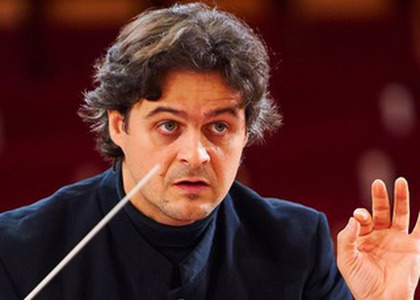> [Archived] Interviews

Interview with the conductor Cristian Orosanu about the concert held alongside the Radio Room Orchestra
Mr. Cristian Orosanu, on wednesdy 30th of march, you'll conduct the concert held by the Radio Room Orchestra, in a Haydn-Mozart-Gounod program. What are your thoughts regarding your return on Radio Hall's stage?
I'm very happy because we'll finally have in the hall a public without restrictions. I have already attended two, even three concerts, where the public came without any restrictions, which makes me very pleased and I felt some kind of an esor from the public. I expected to see a fear of reuniting in a concert hall from people and yet it wasn't like that. At the Friday concert which I attended to at the National Orchestra, the hall was almost full and I was very happy about this. So this is the first positive emotion I have in this period.
The guest will be Julien Libeer, alongside whom you'll interpret the nr.27 concert for piano and Mozart orchestra. Will you collaborate with him for the first time?
Yes, it's time that we'll collaborate for the first time. We're trying for about two years to coordonate our agendas in order to collaborate and we'll finally meet on stage at last.
Having the context of Wednesday's concert, how does the conductor-ensemble relationship work in your case, in relation to the chosen program?
The conductor-ensemble relationship always works well. I have an admiration for my colleagues at the radio, for the musicians from the National Radio Orchestra, as well as from the Radio Room Orchestra. They are two very valuable formations which I conduct each time and in each stage with great pleasure, and regarding the repertoir, alongside this last Mozart concert for piano, I chose an unknown overture by Haydn and a lesser known symphony by Gounod. Why? Because this first symphony by Gounod is written with Haydn's spirit. The style is very much alike, it's a symphony about youth and it fits the context of a classical concert very well. Haydn's overture is called Il ritorno di Tobia and is unfortunately very rarely sung. This song by Haydn was overshadowed by other well known songs and sometimes I like to bring to the surface a few songs which deserve to be discovered both by the public and musicians.
We know that you formed professionally alongside the Radio Orchestras. During your years as a student you activated as a horner for the National Radio Orchestra and later you came back, being constantly present at the desk on Radio Hall's stage. What impact did your collaboration with the Radio Orchestras have for your career as a conductor?
Honestly, I have learned many things singing at the orchestra. Being a student, I had the opportunity to be able to sing at the National Radio Orchestra for five years. And I can say that I've learned as much at the orchestra, as I've learned at the Conservatory, but differently. These are experiences which you can't replace with anything else and what can be learned on the field, as a musician in an orchestra, can't be learned anywhere at the Conservatory. I saw many conductors marching in front in all those years, and I learned many things about what I should and shouldn't do as a conductor.
The late musicologist Grigore Constantinescu described that you have "a talent of combining the mastery of music and the efficiency of the relationship with the ensemble, getting results which can't go unnoticed". What do you think a conductor who captures the audience and the orchestra should be like these days?
In my opinion, the more useful a conductor is in the concert, the more valuable he is. I'd say that a conductor's most important role is in the repetition and the more a conductor manages to make the ensemble sing quasi without the necessity of a conductor, the more value this musician has. Currently there are orchestras which sing without a conductor and I admire this a lot, such as Orchestra Les Dissonances. These challenges have always existed, but in these current times, the musicians from the orchestra are studying and trying to understand the ensemble of a score and not just the stimme they interpret, which is only a small part of the ensemble. So it's a more holistic approach, which means the musicians already understand this a lot better, and although a conductor's presence is very helpful, because a conductor knows how to study a partiture from experience, how to put the musicians together, how to determine them to listen to one another, I return to the idea that a conductor should be, technically speaking, as less present as possible in the concert, because a conductor has or should have an aura which encompasses all the musicians from the orchestra beneath its dome. It's a well known fact that the same song with the same orchestra conducted by more personalities, more conductors, sounds different and this means that each musician who comes at the desk of an orchestra leaves his own mark.
Translated by Hakan Ugur Geafer,
University of Bucharest, Faculty of Foreign Languages and Literatures, MTTLC, year I
Corrected by Silvia Petrescu














